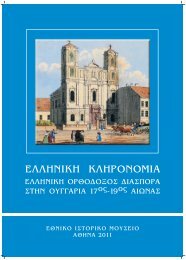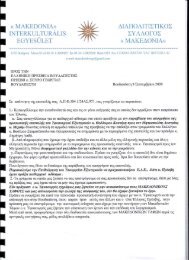Görög Örökség Ελληνική Κληρονομιά - H-ellin.com
Görög Örökség Ελληνική Κληρονομιά - H-ellin.com
Görög Örökség Ελληνική Κληρονομιά - H-ellin.com
Create successful ePaper yourself
Turn your PDF publications into a flip-book with our unique Google optimized e-Paper software.
neglect the vineyards that belonged to his family in Rizovounia not even during the war for freedom which<br />
started in 1703, especially since at the beginning he covered the expenses for the war through his in<strong>com</strong>e from<br />
his property and vineyards. We would not be exaggerating were we to claim that the Tokaj wine was the<br />
financial source that supported the war for freedom, since Rakoczi, after the re-occupation of Rizovounia,<br />
could easily transfer through that area wine to the Polish and Russian markets. The aszu (raisin-wine, a local<br />
specialty) was exceptionally proper also for intercity transportation, whereas the quality of other wines would<br />
have deteriorated during transportation. After the conquest of Tokaj he appointed a ruling representative to<br />
supervise the viniculture and the wine trading.<br />
He used the Tokaj wine to form and maintain relationships on a European basis. His ambassadors sent to the<br />
royal empires and the tsarist courts were always carrying with them some barrels of this wine. Rakoczi<br />
acknowledged the value of the Tokaj wine in diplomacy: the wine that was served in the wining and dining of<br />
Peter the Great and King Elios as " the wine of diplomacy" played a significant role in establishing trust. The<br />
tsar of all Russians was particularly fond of the Hungarian aszu.<br />
At the same period, the Greeks were present in other places of Risovounio. In 1672 in Sárospatak 7 Greek<br />
traders were paying the chamber 72 forint, while in 1693, 9 Greek and 10 Hungarian traders were paying the<br />
so-called "patikaber" ("drug-store rental" which at that time meant the shop rental.).<br />
Concerning the orthodox belief in Tokaj, we consider important to refer to the following text dating back to<br />
1694 which we retrieved and which has been greatly mentioned and analysed: "The Priest of the Greeks and<br />
the Serbs who have recently arrived in our city, archimandrite Isaias...". In the Hungarian greek-catholic<br />
tradition, the archimandrite Isaias is referred to as monk Isaias, translator and <strong>com</strong>poser of psalms. It is proven<br />
that he was a Greek priest but concerning his activities as a translator of psalms, there is no evidence.<br />
No matter the long lasting research that Antal Hodinka carried out, relating to the existence (in his opinion the<br />
"non existence") of the Greek element of Tokaj in the 1Τ century, even he accepted as detrimental evidence a<br />
report of 1760 according to which " the elderly of Tokaj unanimously declare that until 1707 only 2-3 Greek<br />
shop owners who sold their cheap products behind open tables, lived there..."<br />
In the 18 l century the issue was whether the Greek traders of Tokaj should have the rights and privileges that<br />
were offered by Leopold A in 1667 ( and then in 1690). The truth is that in the royal documents Tokaj is not<br />
mentioned, mainly since there is reference to Greek, Serbian and Armenian traders, citizens of the area of<br />
Upper Tisza. It is however obvious from the above mentioned facts that the real centre of the Greeks of<br />
Rizovounio was Tokaj. Although after checking the previously mentioned extract it is apparent even today<br />
that: " Meaning that it is out of the question that there was any business group as a forefather". An important<br />
evidence that proves the existence of the Tokaj group in the 1Τ century is considered to be the letter of the<br />
patriarch of Jerusalem to the G reek priest of Tokaj, written in 169 5.<br />
There is one more evidence relating to the question of the legal succession of the Debrecen- Tokaj group.<br />
Against the Greeks of Debrecen emerged the accusation of transporting money made of noble metal (coins).<br />
Two carts full of silver coins, which were later transferred to Tokaj, were already confiscated from the town of<br />
Debrecen. There were also negotiations between the town of Debrecen and the Greeks who in the meantime<br />
became citizens of Tokaj, in order to settle the issue. The result, however, was not successful and thus the rest<br />
of the Greek citizens of Debrecen moved to Tokaj in 1708. This event supports the claim of the Tokaj Greeks<br />
who firmly sustained for 130 years that they were the owners of the royal letters for the donation of 1667 and<br />
1690. Due to the expansion of bibliography nowadays, were are given the opportunity to <strong>com</strong>pare between the<br />
two settlements of Debrecen and Tokaj based on the family succession. For the above mentioned reason we<br />
collected the full names of the people that maintain the succession (taking into consideration the settlement<br />
and the date):<br />
70




